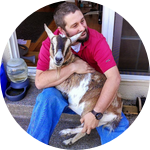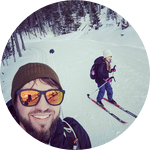About This Project
We are launching a multi-year expedition to film a colossal squid in the deep sea for the first time off Antarctica to learn about its basic biology/behavior. With deep sea cameras we are surveying for the colossal squid to answer key questions about the species such as; how large they grow, most preferred habitats, the use of its massive eye, how it exhibits bioluminescence, and its conservation status.
Ask the Scientists
Join The DiscussionWhat is the context of this research?
The colossal squid is the largest invertebrate in the world, and one of the largest ocean predators. It has the largest eyes in the animal kingdom. It exhibits abyssal gigantism and could weigh as much as 750 kg (1,650 lb.) or more, and the total length is ~10-12 meters (~30-40 ft.). It is heavier than the better-known giant squid, Architeuthis, and likely only lives in the deep sea in the Southern Ocean. Little is known about the colossal squid’s basic biology, behavior, unique use of bioluminescence, and conservation status. Most of the information about this species is from research about toothfish depredation (Remeslo et al) and the capturing of two whole specimens, one in 1981 by our deceased advisor Dr. Alexander Remeslo who passed from COVID-19.
What is the significance of this project?
The colossal squid is an oversized poster species for how much we still have to learn about the ocean. It was first discovered almost 100 years ago in 1925, yet we know very little about its basic biology, behavior, and conservation status.
We are also bringing down the costs and complexity of deep ocean research, the most challenging ecosystem to investigate. The deep sea is still largely unexplored, fragile, but often detached from conservation priorities. It is under enormous threats from bottom trawling, overfishing, plastic pollution, and now deep sea mining. The new camera systems we are developing, and the way we are collaborating with a tourism vessel allows others to follow in our footsteps - opening the deep sea for exploration and entertainment, not extraction.
What are the goals of the project?
With this expedition we seek to answer some basic biological and ecological questions about the colossal squid: How large do they grow? What is their most preferred habitat and what depths do the adults live? Do adult females spawn near the surface? How does it use its massive eye (offense or defense)? Is it attracted to lighted displays? How does it use its bioluminescent photophores around its eyes? Is it an ambush hunter or more active? Is it a pelagic (open-sea) species or will it hang in the fjords? What is its population size and conservation status? A summary paper of what we know about the colossal squid sums it up well: "...its basic biology and ecology remain one of the ocean’s great mysteries" (Rosa et al 2017).
Budget
SubC Imaging is installing the research technologies on the tourism vessel of the ACKBAR II (A Camera for Kraken Baiting and Recording), as well as a custom made crane, and oceanographic winch. This is an essential step in the search for the colossal squid, which is then to be deployed in the Antarctic Peninsula in December 2022.
The technology will help us better understand the colossal squid - and learn more about its hunting behavior, how it uses it's massive eye (for hunting or defense), and its unique bioluminescence, as well as potentially help with other basic biological questions; What depths do they live? How big do they grow? What do they eat? Are they attracted or repelled by bioluminescence/light?
This crucial funding will support travel for the team of researchers to Antarctica, field testing and installing the technologies in Canada, and insuring the equipment.
Endorsed by
 Project Timeline
Project Timeline
We are conducting field tests in Canadian waters off Newfoundland in Summer of 2022, and acquiring research permits. Tech will be loaded in October. A pilot investigation and first expedition to Antarctic waters will occur in December 2022 where we will start to look for the colossal squid. We will then return to Antarctica each year and partner with university students to study the colossal squid onboard the tourism vessel Ocean Endeavour - via Intrepid Travel.
Jul 13, 2022
ACKBAR II Tank Testing in Newfoundland
Oct 03, 2022
Project Launched
Oct 09, 2022
Research Equipment Loaded to the vessel Ocean Endeavour in St. John's Canada
Dec 01, 2022
Pilot Expedition in the Antarctic Peninsula
Meet the Team
Team Bio
The international team from the U.S. (KOLOSSAL), Canada (SubC Imaging), and Australia (Intrepid Travel) is an interdisciplinary combination of marine biologists, deep sea camera developers, and polar tourism operators. They share a passion for ocean exploration and conservation, a love for Tim Tams, and expedition planning zoom meetings filled with big squid talk, spreadsheets, and cheekiness.
Matt Mulrennan
Matt is the Founder and CEO of KOLOSSAL. Matt is a fellow of the Explorers Club, a marine scientist, technology enthusiast, and conservationist. For over 15+ years he has worked in ocean exploration and conservation as a staff researcher at Scripps Institution of Oceanography, a marine scientist at ocean conservation group Oceana, Director of the Ocean Initiative at the XPRIZE Foundation, and was the CEO of EnVest. Alongside KOLOSSAL he works with ocean and climate investing funds. At the helm of Kolossal they became one of 20 candidate groups for the 2018 Pritzker Emerging Environmental Genius Prize - Kolossal was the Grand Prize winner for the Con X Tech Prize for prototyping a deep sea camera system.
He has a Masters in Marine Biodiversity and Conservation from Scripps Institution of Oceanography, UCSD and a Bachelors in Environmental Studies from Miami University.
Chad Collett
Chad started out diving with the Canadian Navy, then worked at NRC-Institute for Ocean Technology, Oceaneering, Welaptega Marine and then founded SubC Imaging. SubC Imaging is a world leader in selling innovative underwater camera technologies.
As a member of Kolossal - Chad and the team at SubC became one of 20 candidate groups for the 2018 Pritzker Emerging Environmental Genius Prize - Kolossal was the Grand Prize winner for the Con X Tech Prize for prototyping a deep sea camera system.
Additional Information
This crowdfunding campaign is now closed, but donations to the ongoing colossal squid expeditions to Antarctica are available at the KOLOSSAL website. KOLOSSAL is an ocean exploration and conservation non-profit (501C3) based in Venice, California. Donations can be tax deductible.
About the ACKBAR I (A Camera for Kraken Baiting and Recording) deep sea camera system, and winner of the grand prize in the Con X Tech Prize - a global prototyping competition for conservation technology:
Conservation X Labs Awards Inaugural Con X Tech Prize Honors. Conservation X Labs. December 2018.
An award-winning new tool to explore and protect deep-sea habitats. ecoEssentials. March 2019.
Overview Video of the ACKBAR's First Dive - Grand Prize Winner Con X Tech Tech Prize. YouTube. November 2018.
Deep Sea Wildlife From First Dive. YouTube. November 2018.
Media Hits about the Colossal Squid Expedition:
Team from N.L. traveling to Antarctica in search of the elusive colossal squid. CBC. Nov. 30th 2022. (Print, radio, and nationally broadcast TV).
Kraken the code..of squid. Where We Live. NPR. January 2019. (interview about the colossal squid expedition starts around 23:00).
Newfoundland company hopes to catch colossal squid on film. Weather Network. December 2018.
Conservation X Labs. 2018. Conservation X Labs Awards Inaugural Con X Tech Prize Honors.
Conservation Goals:
Along with the science, we also want to inspire the public about the ~90% of the ocean largely unexplored, and the biodiversity we risk losing. We will use a documentary to get people engaged in major decisions impacting the ocean - such as passing the High Seas Treaty, expansion of Antarctic marine reserves, and how individuals can make seafood decisions that impact far away nearly pristine ecosystems. This isn't just a monster squid hunt, it's a call to action for better understanding and protecting our ocean.
References:
Clarke, M.R. (1980). "Cephalopoda in the diet of sperm whales of the southern hemisphere and their bearing on sperm whale biology". Discovery Reports. 37: 1–324.
McClain, Craig R.; Balk, Meghan A.; Benfield, Mark C.; Branch, Trevor A.; Chen, Catherine; Cosgrove, James; Dove, Alistair D.M.; Gaskins, Lindsay C.; Helm, Rebecca R.; Hochberg, Frederick G.; Lee, Frank B.; Marshall, Andrea, McMurray, Steven E.; Schanche, Caroline; Stone, Shane N.; Thaler, Andrew D. (2015). "Sizing ocean giants: patterns of intraspecific size variation in marine megafauna". PeerJ. 3: e715.doi:10.7717/peerj.715.
Robson, G. C., (1925): On Mesonychoteuthis, a new genus of oegopsid Cephalopoda. Annals and Magazine of Natural History, (series 9) 16. 272-277.
Remeslo, A. V.; Yakushev, M. R.; Laptikhovsky, V. (2015). "Alien vs. Predator: interactions between the colossal squid (Mesonychoteuthis hamiltoni) and the Antarctic toothfish (Dissostichus mawsoni)". Journal of Natural History. 49 (41– 42): 2483–2491.doi:10.1080/00222933.2015.1040477.
Remeslo, Alexander; Yukhov, Valentin; Bolstad, Kathrin; Laptikhovsky, Vladimir (2019). "Distribution and biology of the colossal squid, Mesonychoteuthis hamiltoni: New data from depredation in toothfish fisheries and sperm whale stomach contents". Deep Sea Research Part I: Oceanographic Research Papers. 147: 121–127.doi:10.1016/j.dsr.2019.04.008.
Roper, C.F.E. & P. Jereb (2010). Family Cranchiidae. In: P. Jereb & C.F.E. Roper (eds.) Cephalopods of the world. An annotated and illustrated catalogue of species known to date. Volume 2. Myopsid and Oegopsid Squids. FAO Species Catalogue for Fishery Purposes No. 4, Vol. 2. FAO, Rome. pp. 148–178.
Rosa, Rui; Lopes, Vanessa M.; Guerreiro, Miguel; Bolstad, Kathrin; Xavier, José C. (2017). "Biology and ecology of the world's largest invertebrate, the colossal squid (Mesonychoteuthis hamiltoni): a short review"(PDF). Polar Biology. 40 (9): 1871–1883.doi:10.1007/s00300-017-2104-5.
Rosa, R. & B.A. Seibel (2010). Slow pace of life of the Antarctic colossal squid. Journal of the Marine Biological Association of the United Kingdom, published online on 20 April 2010.doi:10.1017/S0025315409991494
Xavier, José C.; Raymond, Ben; Jones, Daniel C.; Griffiths, Huw (2015). "Biogeography of Cephalopods in the Southern Ocean Using Habitat Suitability Prediction Models"(PDF). Ecosystems. 19 (2): 220– 247.doi:10.1007/s10021-015-9926-1.
Project Backers
- 64Backers
- 131%Funded
- $12,605Total Donations
- $196.95Average Donation


